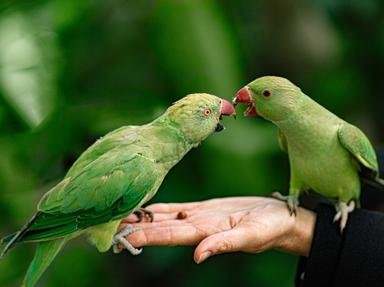Quiz Answer Key and Fun Facts
1. Sometimes my parrot crouches down low on his perch, stretches his neck out in one direction, and flutters his wings. What does he want to do?
2. Whenever I put my lory on my shoulder, he tries to stick his tongue in my ear. Why does he do that?
3. In the spring and summer, my parrot always takes over one of my cabinets, shoving everything out and spending long hours sitting in it. I don't mind that. But why does she try to chase me away whenever I walk by?
4. Aaargh! My parrot just chewed up my antique Victorian sofa! Then he went for the wooden baseboards! Why does he have to chew so much? Which of these is *NOT* a reason why?
5. I have a problem with my Hanging Parrot. Whenever I go to turn off the light at night, it's hanging upside down from the roof of its cage. I don't want it to go to sleep in such a dangerous position! What's wrong with it? How do I get it to stop?
6. My parrot keeps getting pin feathers and blood feathers. They seems to make her really uncomfortable. What do I do to prevent them?
7. My parrot acts funny when I pet her on the back. It doesn't happen when I scratch her head or rub her under the wings. What's going on?
8. Sometimes my parrot flashes his irises, puffs out the feathers on his head, fans his tail, and starts walking up and down his perch. What does that mean?
9. Sometimes my Pionus parrot has this sort of sweet aroma. Does this mean he's sick?
10. Whenever I cuddle with my macaw, he starts throwing up. Why?
Source: Author
pu2-ke-qi-ri
This quiz was reviewed by FunTrivia editor
crisw before going online.
Any errors found in FunTrivia content are routinely corrected through our feedback system.

